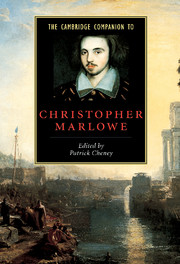Book contents
- Frontmatter
- 1 Introduction: Marlowe in the twenty-first century
- 2 Marlowe’s life
- 3 Marlovian texts and authorship
- 4 Marlowe and style
- 5 Marlowe and the politics of religion
- 6 Marlowe and the English literary scene
- 7 Marlowe’s poems and classicism
- 8 Tamburlaine the Great, Parts One and Two
- 9 The Jew of Malta
- 10 Edward II
- 11 Doctor Faustus
- 12 Dido, Queen of Carthage and The Massacre at Paris
- 13 Tragedy, patronage, and power
- 14 Geography and identity in Marlowe
- 15 Marlowe’s men and women
- 16 Marlowe in theatre and film
- 17 Marlowe’s reception and influence
- Reference Works
- Index
- Series list
- Plate section
12 - Dido, Queen of Carthage and The Massacre at Paris
Published online by Cambridge University Press: 28 May 2006
- Frontmatter
- 1 Introduction: Marlowe in the twenty-first century
- 2 Marlowe’s life
- 3 Marlovian texts and authorship
- 4 Marlowe and style
- 5 Marlowe and the politics of religion
- 6 Marlowe and the English literary scene
- 7 Marlowe’s poems and classicism
- 8 Tamburlaine the Great, Parts One and Two
- 9 The Jew of Malta
- 10 Edward II
- 11 Doctor Faustus
- 12 Dido, Queen of Carthage and The Massacre at Paris
- 13 Tragedy, patronage, and power
- 14 Geography and identity in Marlowe
- 15 Marlowe’s men and women
- 16 Marlowe in theatre and film
- 17 Marlowe’s reception and influence
- Reference Works
- Index
- Series list
- Plate section
Summary
On first consideration, Dido, Queen of Carthage and The Massacre at Paris may seem an odd couple to discuss in tandem. In many ways the plays represent polarities within the Marlowe canon. Despite the many questions surrounding the dating of Dido, Queen of Carthage, most scholars agree that it is Marlowe's first dramatic effort, perhaps scripted while he was still a student at Cambridge, and The Massacre at Paris one of his last, probably written sometime in 1592. Moreover, Dido finds its provenance in classical epic, dramatizing Books 1, 2, and 4 of Virgil's Aeneid with a veneer of Ovidian shading from the Heroides, whereas The Massacre is Marlowe's only play based on topical events, a rehearsal of recent upheavals in France. Additionally, whereas Dido was first performed by boy actors for a private theatre, The Massacre was apparently acted by a professional company. Finally, although many aspects of Dido have been interrogated - authorship, date, genre - the text of the play has not been questioned; conversely, The Massacre is generally accepted as Marlowe's most corrupt text, most likely the truncated product of memorial reconstruction by a troop of actors.
However, despite these many antitheses, similarities between the two plays abound, a number of which will be examined in this chapter. Although both plays share a traditional scholarly neglect, both have recently evoked considerable critical interest. Moreover, each play presents tragic protagonists – Dido and the Guise – who struggle for national leadership within a complex web of political and amatory events that determine their downfalls, even though in Dido the web is woven by the gods, in The Massacre by combating political forces. In addition, in typical Marlovian fashion, both plays dramatize multiple inversions of accepted rubrics of politics, gender, and sexuality, and in both plays the accepted audience response to these subversive behaviours has been debated by commentators.
- Type
- Chapter
- Information
- The Cambridge Companion to Christopher Marlowe , pp. 193 - 206Publisher: Cambridge University PressPrint publication year: 2004



